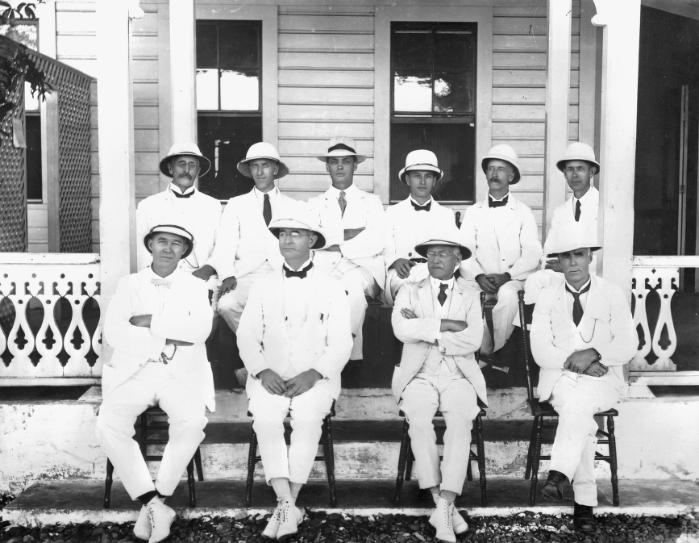|
1924 Western Samoan General Election
General elections were held in Western Samoa on 23 January 1924.Lauofo Meti (2002) ''Samoa: The Making of the Constitution'', National University of Samoa, p18 Background A Legislative Council was established by the Samoa Constitution Order 1920, which provided for an unelected body of at least four 'official' members (civil servants) and a number of nominated 'unofficial' members, who were not allowed to outnumber the official members. The first Legislative Council consisted of the Chief Judge, the Commissioner of the Crown Estates, the Secretary to the Administration, the Secretary of Native Affairs and the Treasurer, with Arthur Keeling, Fred E. Syddall and Alfred John Tattersall as the unofficial members.Meti, p17 The Samoa Constitution Order 1920 was superseded by the Samoa Act 1921, although the membership of the Legislative Council remained unchanged until 1923, when an amendment (the Samoa Legislative Council (Elective Membership) Order 1923) increased the number of mem ... [...More Info...] [...Related Items...] OR: [Wikipedia] [Google] [Baidu] |
Samoa
Samoa, officially the Independent State of Samoa; sm, Sāmoa, and until 1997 known as Western Samoa, is a Polynesian island country consisting of two main islands (Savai'i and Upolu); two smaller, inhabited islands (Manono Island, Manono and Apolima); and several smaller, uninhabited islands, including the Aleipata Islands (Nu'utele, Nu'ulua, Fanuatapu and Namua). Samoa is located west of American Samoa, northeast of Tonga (closest foreign country), northeast of Fiji, east of Wallis and Futuna, southeast of Tuvalu, south of Tokelau, southwest of Hawaii, and northwest of Niue. The capital city is Apia. The Lapita culture, Lapita people discovered and settled the Samoan Islands around 3,500 years ago. They developed a Samoan language and Samoan culture, Samoan cultural identity. Samoa is a Unitary state, unitary Parliamentary system, parliamentary democracy with 11 Administrative divisions of Samoa, administrative divisions. It is a sovereign state and a member of the ... [...More Info...] [...Related Items...] OR: [Wikipedia] [Google] [Baidu] |
Legislative Assembly Of Samoa
The Legislative Assembly ( sm, Fono Aoao Faitulafono a Samoa), also known as the Parliament of Samoa ( sm, Palemene o Samoa), is the national legislature of Samoa, seated at Apia, where the country's central administration is situated. Samoan Parliament is composed of two parts: the O le Ao o le Malo (head of state) and the Legislative Assembly. In the Samoan language, the Legislative Assembly of Samoa is sometimes referred to as the Samoan Fono while the ''government'' of the country is referred to as the Malo. The word ''fono'' is a Samoan and Polynesian term for councils or meetings great and small and applies to national assemblies and legislatures, as well as local village councils. The modern government of Samoa exists on a national level alongside the country's '' fa'amatai'' indigenous chiefly system of governance and social organisation. In his or her own right, the O le Ao o le Malo can summon and call together the Legislative Assembly, and can prorogue or dissolve P ... [...More Info...] [...Related Items...] OR: [Wikipedia] [Google] [Baidu] |
Arthur Keeling
Arthur is a common male given name of Brythonic origin. Its popularity derives from it being the name of the legendary hero King Arthur. The etymology is disputed. It may derive from the Celtic ''Artos'' meaning “Bear”. Another theory, more widely believed, is that the name is derived from the Roman clan '' Artorius'' who lived in Roman Britain for centuries. A common spelling variant used in many Slavic, Romance, and Germanic languages is Artur. In Spanish and Italian it is Arturo. Etymology The earliest datable attestation of the name Arthur is in the early 9th century Welsh-Latin text ''Historia Brittonum'', where it refers to a circa 5th to 6th-century Briton general who fought against the invading Saxons, and who later gave rise to the famous King Arthur of medieval legend and literature. A possible earlier mention of the same man is to be found in the epic Welsh poem ''Y Gododdin'' by Aneirin, which some scholars assign to the late 6th century, though this is still a mat ... [...More Info...] [...Related Items...] OR: [Wikipedia] [Google] [Baidu] |
